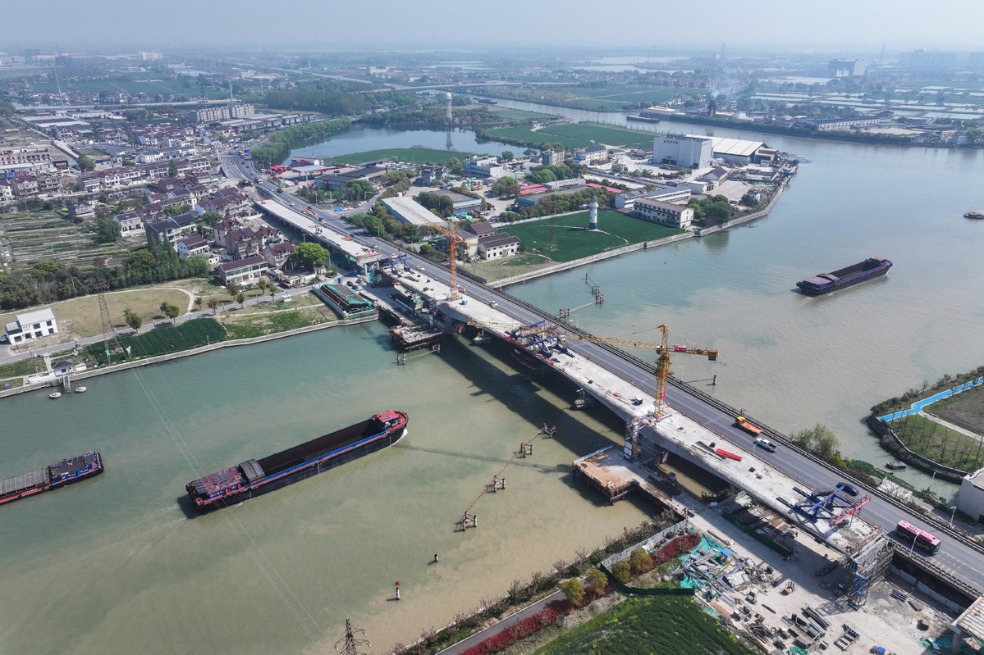Tech to empower urban infrastructure
Resilience sought by government to address challenges of modern age


China is stepping up efforts to make its cities more resilient against potential challenges, unveiling a sweeping guideline last month to develop new urban infrastructures empowered by cutting-edge technologies.
The policy document, jointly issued by the general offices of the Communist Party of China Central Committee and the State Council, said "new urban infrastructures" are digitalized, intelligent and empowered by information technologies, and thus are better at adapting to and recovering from disasters.
The guideline has set a goal for the country to make significant progress in constructing new urban infrastructures to support urban resilience by 2027. By 2030, the country is expected to develop a number of highly resilient cities that are safer, more orderly, smarter and more efficient.
Urban resilience, according to the United Nations Human Settlements Programme, is "the measurable ability of any urban system, with its inhabitants, to maintain continuity through all shocks and stresses".
The issue of urban resilience has grown more pressing as China's rapid urbanization continues. With more than 930 million people now living in urban areas, the country faces increasing risks to its urban infrastructure.
An official with the Ministry of Housing and Urban-Rural Development, while explaining the guideline, said cities are threatened by an increasing number of risks and challenges.
"Various kinds of disasters and accidents easily happen (in cities), jeopardizing people's lives and socioeconomic development. Thus it is imperative to strengthen the construction of resilient cities and make urban safety governance more modernized," the official said.
The fast expansion of cities and climate change have made it a pressing issue to increase urban resilience in China, experts said.
A report compiled by the China Development Research Foundation and published in February said the more frequent occurrence of extreme weather incidents due to global warming "has become a major challenge" for Chinese cities, home to more than 65 percent of the country's population.
The country witnessed "the fastest development and expansion of cities" from the mid-1990s to the early 21st century, it said, adding that infrastructures that were built in a short time with a relatively lower standard may turn out to be less reliable in future disaster response.
Yuan Hongyong, executive president of the Hefei Institute for Public Safety Research at Tsinghua University, pointed out another specific risk for urban resilience that has arisen during China's energy transition drive.
China is promoting power generation by natural gas in an effort to lower carbon emissions, which has led to the burying of a large number of gas pipelines, Yuan said in an interview in November.
Even tiny leaks from the gas pipelines, which are often caused by erosion and subsidence, can threaten the complicated pipeline system underground and lead to serious accidents in densely populated urban areas, Yuan said.
As a result, it is a vital issue, as well as a major subject for the institute to develop technologies to promptly detect and treat leaks, according to Yuan.
The latest guideline laid out 11 major specific tasks, one of them being to make lifeline infrastructures — infrastructures affecting residents' basic well-being — smarter.
A thorough survey, as well as timely updates, of the conditions of these infrastructures, is needed, the guideline said, adding that local authorities should digitalize water supply, drainage, power supply, gas, heating, fire hydrant and underground pipeline systems based on local conditions, and manage them using smart technologies.
An accurate and safe data system covering all kinds of underground pipelines should be built, and so should a platform of basic data concerning the entire process of planning, construction, operation and maintenance of them, it said.
The guideline requires strengthening intelligent monitoring to prevent gas leaks, adopting effective flood-prevention measures to protect booster pumps that provide water for residents, enhancing the ability of subways and underground parking lots to mitigate flooding, and enhancing monitoring of the operation of bridges and tunnels.
Local authorities should focus on issues such as elevators in old residential buildings, earthquake resistance of old buildings, firefighting equipment and escape routes, and form a digital profile of the hidden dangers in buildings, the guideline said.
They were also asked to update information on basic facts and hazards detected in buildings during the process of urban construction and renewal, and improve the mechanism of eliminating the hazards.
The guideline also encouraged building an "integrated sensory system" of infrastructures, including roads, to support the development of intelligent connected vehicles, and gradually expanding the use of driver assistance and self-driving.
Noting that the guideline covers multiple areas of urban construction, the official from the Ministry of Housing and Urban-Rural Development highlighted the key role of technological innovation, saying cities must continue to digitalize their infrastructures to better sense risks and tackle emergencies.
Zhou Hua, head of the housing and urban-rural development bureau of Wulian county, Shandong province, said building resilient cities is a crucial step toward modernizing urban governance.
He said that traditional urban management often relies on fragmented approaches, where various departments operate independently, relying more on experience rather than data-driven decision-making.
The county recently set up a network of internet of things sensing devices covering its gas, heating, water supply, drainage infrastructures and bridges, Zhou said, adding that such a network has reformed the county's approach to managing risks, making urban operations safer and more reliable.
"By deeply integrating modern information technology with urban lifeline projects, we are injecting new vitality and intelligence into the development of our city," he explained.
Wang Naiyu, director of the REN Center for Urban Resilience at Zhejiang University, said the interconnection and interaction among the various urban infrastructures pose a "major deficiency in the face of extreme disasters".
A resilient city should be able to focus on the capacity of the whole system of infrastructures, instead of specific infrastructures, and conduct quantitative analysis and simulation for disaster prevention, response and post-disaster recovery, Wang said, adding that advanced technologies, including big data, artificial intelligence and cloud computing, are needed for this end.
Cities using these technologies are able to collect the massive amounts of information needed to assess and improve the resilience of urban infrastructures, Wang said. Cities can monitor the infrastructures' conditions continuously and detect the weak spots by setting up a network of sensors and using intelligent algorithms, she added.
"Digital technologies and artificial intelligence are developing fast. The technologies must be utilized during the planning and construction of various urban infrastructures to further refine their operation and management," Wang said.
Zhu Lixin contributed to this story.
- China develops all-angle ship monitoring system to enhance navigation safety
- China eases marriage rules to encourage more couples to say 'I do'
- China revises regulations to facilitate marriage registration
- Lifeline Express provides free surgeries to 240k patients
- Spring blossoms draw crowds in Beijing
- Over 9,000 children to benefit from Red Cross heart screening program in Xinjiang



































